Buying a car on finance is one of the easiest ways to get on the road and even premium brands such Audi and BMW suddenly become more affordable.
However, car finance is also a minefield, so you should always be clued up before you walk into the dealership.
Here is everything that you need to know about buying a car on finance…
Different types of car finance
Personal Contract Purchase (PCP)
This is one of the most popular method of car finance, as the deposits and repayments are low. PCP enables you to have a brand new car, in exchange for a deposit and monthly repayments. At the end of the agreement (usually 3-4 years), you hand the car back to the dealership in good condition, with allowances for ‘fair wear and tear’. If you decide you want to keep the car, you have the option to make a final balloon payment to keep it. The balloon payment is agreed at the start of your contract, based on the car’s value and how much it will depreciate over time. With PCP, the monthly price of the car is based on the deposit you make, the overall cost of the car, the interest rate and the Guaranteed Future Minimum Value – which is how much the dealer expects they will be able to sell the car on for.
Personal Contract Hire (PCH)
Personal Contract Hire is similar to the way that you would hire a car whilst abroad. You will pay an amount upfront, followed by monthly payments, over the course of a few years. Once the contract ends, you won’t own the car or have the option to buy it, so you will simply give it back. Instead of a deposit, the upfront fee is known as initial rental, and it is calculated as three, six or nine of the monthly payment, rather than being flexible. Your contract will specify how many miles you can cover, and the fee if you go over. With leasing, you have the option to add a service plan to your agreement, so you will never need to pay for services and minor repairs like tyres. Personal Contract Hire is popular with online leasing companies, such as All Car Leasing.
Hire Purchase
With a hire purchase agreement, you will own the car outright at the end of the contract. You pay an initial deposit, and then a finance company will loan you the rest of the money for the car, which you pay back in monthly instalments. The deposit and monthly repayments will depend on the cost of the car, the interest rate and the length of the agreement. Hire purchase agreements don’t include a restriction on mileage or wear and tear, as the car will be yours to keep.
Bank Loan
A bank loan is an alternative to finance, which means you can drive a brand new car without worrying about going over a mileage limit or having to return it. By using a bank or building society loan, you will own the car as soon as you get the keys, and you can sell it on whenever you want to, without the restrictions of finance.
Advantages and Disadvantages of PCP
Pros:
- The monthly payments are lower than hire purchase.
- You can be flexible with the amount of deposit that you pay.
- You can choose the length of the agreement – usually up to 48 months.
- You don’t have to keep the car at the end of the contract; you can get a new one.
- You can choose to pay the finance off early.
Cons:
- After you’ve made all the payments, you don’t own the car.
- If you go over your agreed mileage, you will have to pay a fee – usually per mile.
- If the car is damaged beyond fair wear and tear, you’ll have to pay.
Advantages and Disadvantages of PCH
Pros:
- Monthly payments are fixed, so you don’t need to worry about them being affected by interest rates.
- There’s no risk of the vehicle depreciating in value.
- It allows you to change your car every few years, so you’ll always drive the latest models.
Cons:
- If you opt for a maintenance plan, your monthly payments will increase.
- You can’t keep the car at the end of the contract.
- The initial rental can be costly.
- Your mileage is limited and there are costs for excessive wear and tear.
Advantages and Disadvantages of HP
Pros:
- The car is yours at the end of the agreement.
- You can choose the length of time to make the repayments.
- You won’t be fined for excessive wear and tear.
- There are no restrictions on mileage.
Cons:
- The car isn’t yours until you have made the final payment.
- Hire purchase can be more expensive than taking a loan out to buy the car.
- The monthly repayments are higher than a PCP agreement.
Advantages and Disadvantages of a bank loan
Pros:
- You own the car from the start.
- The interest rates from banks are more competitive and often fixed.
- You can arrange the finance over the phone.
- You can sell the car whenever you want.
Cons:
- It can affect your ability for further lending i.e. mortgages.
- You need to have a good credit rating for the banks to accept you.
- In most cases you will have to pay off the interest before you can pay for the car.
- The rates vary so you will need to shop around.
What to consider
- Always compare the total cost of borrowing including the interest and charges.
- Don’t forget that you will need to be able to afford the car’s running costs (fuel, servicing, MOTs, road tax and repairs) on top of the finance payments.
- Compare interest rates between providers, and remember that the more deposit you pay, the lower your interest rate should be.
- Don’t be pushed into buying dealership extras like GAP insurance, which pays out if your car is stolen or written off.
 Automotive Blog Automotive Blog brings you the latest news, car reviews and information on the automotive industry.
Automotive Blog Automotive Blog brings you the latest news, car reviews and information on the automotive industry.




